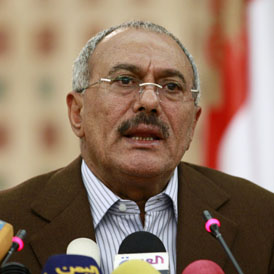Yemen President ‘will step down by the end of the year’
After weeks of protests against his rule, Yemen’s President Ali Abdullah Saleh has said that he will step down early but will not hand power to the military.

The President’s offer comes after several high-level officials, including the country’s senior military commander, withdrew their support for him. Major General Ali Mohsin al-Ahmar, who resigned this week, is now leading soldiers form the First Armored Division in protecting the protestors in the capital Sana. The streets are being patrolled by armoured vehicles from both sides.
But President Saleh made clear in a television speech that he would not hand power to army commanders who have joined the opposition. He said that a military coup could lead to civil war in Yemen: “Those who want to climb up to power through coups should know that this is out of the question. The homeland will not be stable, there will be a civil war, a bloody war.”
He said: “Any dissent within the military institution will negatively affect the whole nation. The nation is far greater than the ambition of individuals who want to seize power.”
The pressure for him to step down increased after Friday’s attack by security forces on unarmed anti-government protestors.
Government supporters and security forces attacked Change Square at Sanaa University immediately after Friday prayers. Eye witnesses said that security forces on roof tops of buildings near Sana’a University were wearing masks and shot for more than twenty minutes directly at protestors.
Following the attack, senior ruling party official Mohammed abu Lohoom condemned it and said President Saleh should hand over power: “Saleh must announce an initiative that results in him leaving power and giving people the right to choose who to lead them.” On Sunday, the President dismissed his entire cabinet.
The protests have been going on in the capital since 21 February, inspired by the success of the Egyptian demonstrators in achieving the overthrow of President Hosni Mubarak.
A spokesman for the Joint Meeting Parties said on Tuesday that there will be a march towards the presidential palace on Friday. The protestors will be protected by the army personnel who have so far defected from the government. Muhammad Qahtan said the time for initiatives to address the situation has passed.
"Many military commanders and senior officials, including ambassadors and ministers resigning from their posts, joined the tens of thousands who have been staging a sit-in outside Sana's University to call for the resignation of Saleh."
Hakim Almasmari, Publisher and Editor in Chief of the Yemen Post, reports on the increasingly tense divisions between President Ali Abdullah Saleh and senior military figures in Yemen.
Read more at Yemen: Saleh warns military coup could lead to civil war
United States ally
President Ali Abdullah Saleh has traditionally had the backing of the United States, which sees Yemen as playing a key role in the war on terror. Al Qaeda in the Mahgreb are based in the south east of the country. But the killing of unarmed protestors was condemned by the US government.
The Deputy National Security Advisor, Ben Rhodes, said that the White House “communicated to the Yemeni government that that kind of violence is unacceptable.”
Other countries have joined in the condemnation of the violence. On Monday French Foreign Minister Alain Juppe said: “We estimate that the departure of President Saleh is unavoidable.”